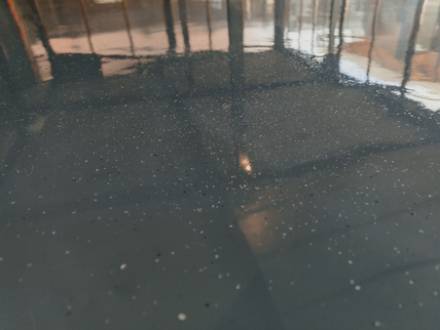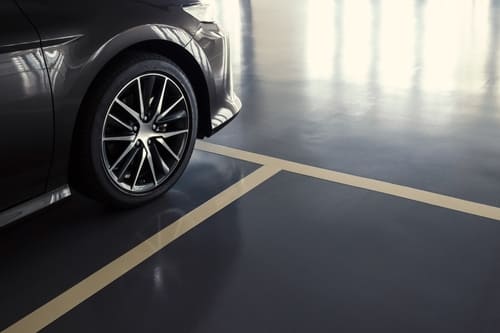Recent Blog Posts
How is Epoxy Floor Coating Different Than Rubber Flooring?
 So - You are ready to choose new flooring material for your basement and garage. A friend has mentioned rubber flooring, but you love the shine and array of choices of epoxy floor coatings. Although the rubber flooring does seem to be budget-friendly and relatively versatile, you just cannot seem to make up your mind! Fortunately, our flooring professionals have some information we hope will help you make your decision.
So - You are ready to choose new flooring material for your basement and garage. A friend has mentioned rubber flooring, but you love the shine and array of choices of epoxy floor coatings. Although the rubber flooring does seem to be budget-friendly and relatively versatile, you just cannot seem to make up your mind! Fortunately, our flooring professionals have some information we hope will help you make your decision.
First, consider how you will use the space. Does your garage actually have vehicles parked inside, or, like most people’s garages, is it largely used for storage and projects? If you are considering your basement, is it primarily a play area for younger children, a hang-out place for teens, a space where you enjoy crafting, or a total "man cave"? The way your space will be used is important when considering flooring. Speaking to an experienced Maryland epoxy floor professional from Prestige Floor Coating can help you determine if an epoxy floor is right for you.
5 Reasons Epoxy Floor Coating is Superior to Concrete
 You may be trying to decide whether you want an epoxy floor coating or a polished concrete floor for your garage or basement. If so, there are several factors you should take into consideration. First, think about what is important to you. Do you want a low-maintenance floor? One that is durable and will last for years? How about style and visual appeal? Maybe all of these factors are important to you.
You may be trying to decide whether you want an epoxy floor coating or a polished concrete floor for your garage or basement. If so, there are several factors you should take into consideration. First, think about what is important to you. Do you want a low-maintenance floor? One that is durable and will last for years? How about style and visual appeal? Maybe all of these factors are important to you.
Consider your budget and how the space will be used. While budget is important, epoxy floor coating is affordable and superior to polished concrete in many ways. Speaking to a knowledgeable Maryland epoxy floor professional from Prestige Floor Coating can help you make the right decision for your space.
Why Choose Epoxy Floor Coating?
While there are a multitude of reasons to choose epoxy floor coating, below are five great reasons to choose epoxy floor coating over polished concrete:
How to Clean Epoxy Floors
Our 4 Tips for Sparkling Flooring
Epoxy coatings can make your garage or basement floor look cleaner, more professional, and more finished. However, just like any other floor, you'll want to keep it cleaned. Fortunately for you, it's easy to do! If you want to keep your newly coated epoxy floors looking pristine, here are some cleaning tips that will help.
1. Use a Dust Mop Regularly
The most important thing you can do to keep your epoxy floors clean is to keep them dusted. A dust mop, preferably one that is at least two feet wide, is an important tool to have on hand. Dust and dirt can damage the surface of the coating if left unattended, but they are easily removed with the dust mop. Plan to dust once a week. If you keep up with this task, then your maintenance will be even easier.
2. Wet Mop Occasionally
Every three to four months, use a wet mop and an epoxy cleaner to mop the floor. This will get up any grit or grime that has become stuck to the floor but is not touched by the dust mop. To ensure you are not just moving dirt around, make sure you rinse the mop often in the cleaner. After mopping, allow the floor to air dry.
How to Spruce Up Your Patio with Epoxy Paint
Concrete patios may be fairly durable, but hygiene and aesthetics are another story. Perhaps your patio has developed mold, cracks, stains, or little nooks and crannies that trap dirt. Epoxy patio coatings improve the look while lowering maintenance needs so your family can enjoy a clean and stylish outdoor living space.
What Are Patio Epoxy Coatings?
Rather than just painting or staining concrete, an epoxy floor coating is a multilayered process. The installers first grind the surface smooth, then apply a primer that bonds with the concrete.
A scratch-resistant, nonfading polymer layer then gives the concrete a brand-new color and appearance. Finally, a clear topcoat ensures your epoxy patio floor is easy to clean and ready to last for decades.
Designed for Outdoor Floors
While many concrete floor coatings are formulated for garages and basements, your patio epoxy can be customized for outdoor use in the local climate.
Polymer, Polyurethane, or Polyaspartic Floor Coatings - What's the Difference?
When shopping for floor coatings, you may find yourself overwhelmed by your options. With so many different materials available, choosing the right option for your needs is not always easy. At Prestige Floor Coating, we offer a number of options for our customers in Maryland, Washington, DC, Virginia, Delaware, and Southern Pennsylvania, including versatile polymers like polyurethane and polyaspartic floor coatings. Here is a closer look at what these options are, so you can choose the right one for your needs.
Polymer Floor Coatings – A Versatile Option
A polymer is a chemical compound that bonds different chemicals to achieve a coating that is moisture-, bacterial-, and impact-resistant. Polymer floor coatings include many sub-categories and offer many benefits to those who install them. Depending on the polymer you choose, you will benefit from:
- Heat resistance
- Foot traffic resistance
- Improved aesthetics
- Bacteria resistance
Benefits of Floor Coatings in the Winter
In Maryland and Washington, DC, winter weather can bring snow, ice, and slush. Because of this, winter is hard on your concrete floors. Every time you drive your car into your garage, you track in snow, slush, and salt. These items can damage your floors, leading to cracks that are costly to repair. Floor coatings can protect your concrete floors from these and other winter risks, giving your floors a longer potential lifespan. Here is a closer look at some of the benefits of floor coatings in the winter when you have concrete floors.
Improved Aesthetics
Do you really want to spend the cold winter months washing your garage floor? Of course not, but if you don't the grit and grime you track in on the wheels of your car will leave the floor looking dull and dingy. This hurts the aesthetics of your garage and will create a much harder cleanup job when the spring weathers come. In fact, the salt and slush that gets tracked into your garage in the winter can actually stain your concrete. Because of concrete’s porous surface, this dirt is more than just surface deep, leaving you with a lengthy cleaning process. Concrete floor coatings are much easier to clean, protecting the look of your concrete.
How Long Will Epoxy Floors Last?
Before you empty your garage to get a floor coating put down, you should make sure you’re getting a solution that will last a long time. Nobody wants to see brittle flakes of paint peeling up just months after they’ve had their concrete painted. Fortunately, there’s a better solution than paint. Epoxy floors can last years or even decades—with the right preparation and installation.
Epoxy Floor Lifespan
We can all agree that when we talk about how long an epoxy floor lasts, we mean how long before it needs to be replaced. In other words, at what point will it be dulled, stained, peeled, or chipped so badly that you want a mulligan?
Professional-strength epoxy floors are thick, multi-layered, and formulated to be resilient against chemicals, grease, humidity, and high-impact force. Whereas a floor paint will wear down and crack from the friction of car tires or peel and fade due to weather and age, an epoxy floor can fight off these elements for many, many years.
Pros & Cons of an Epoxy Floor
Not everyone gets as excited about concrete floor coatings as we do, but nobody can argue with the results. An epoxy floor lasts longer, maintains its good looks, and is easier to keep tidy than any other floor covering you might be considering.
Even still, we understand that not everyone will decide that a premium epoxy floor coating is right for them. If you decide to lay down rubber mats or let your floors continue to wear down, remember why epoxy floors are worth it for an attractive, long-lasting solution.
Call us at 443-519-2628 to learn more about the pros and cons of an epoxy floor coating.
Epoxy Floor Advantages
Style and function go hand-in-hand with epoxy floors. Trusted for industrial floors, commercial kitchens, hospitals, and auto shops, an epoxy floor coating also makes an attractive choice for home renovations, patios and outdoor living spaces, and retail showrooms.
How to Maintain High Traffic Floors
Floor Coating Company in Maryland
When it comes to high-traffic floors, maintenance can often present an issue. Your flooring is one of the first things someone subconsciously notices, thus influencing the first impressions your space makes.
Epoxy floor coatings will give your floors a polished, glossy look that provides superior protection. But, over time, dirt and debris from heavy foot or machinery traffic can act as an abrasive and wear down the protective outer layers of the epoxy.
Too much foot traffic can leave your floors looking dull, dirty, and unappealing and affect the overall safety of your floors. But, with minimal maintenance and care, you can protect the stunning beauty of your floors and enhance performance. Here’s what you should know about how to maintain high-traffic floors.
Routine Cleaning
When it comes to high-traffic areas, a moderate amount of upkeep will be needed. For commercial and industrial spaces, epoxy floors should be swept daily. For residential applications in high-traffic areas, sweeping your floors weekly should be sufficient.
Benefits of Garage Floor Coating
For decades, the garage has also been a favorite hub for family activities. From the kids learning how to ride a bike or fix a car to weekends filled with basketball and grilling out, the garage is the central gathering place for the entire family.
For garage floor coating services in the Maryland and Northern Virginia area, contact us today!
Benefits of Garage Floor Coating
At the heart of family activities, your garage floor takes quite a bit of abuse. Remember that oil leak the family car had last fall? Or the paint spilled from the kids’ arts and crafts project last weekend? And what about that dent in the floor from the toolbox your teenager dropped last summer?
As one of the most popular, high-performance materials for garage floors, the benefits of epoxy garage floor coatings simply can’t be beaten. Here’s what you should know about what makes this garage floor coating so great and why it may be the right choice for you.




